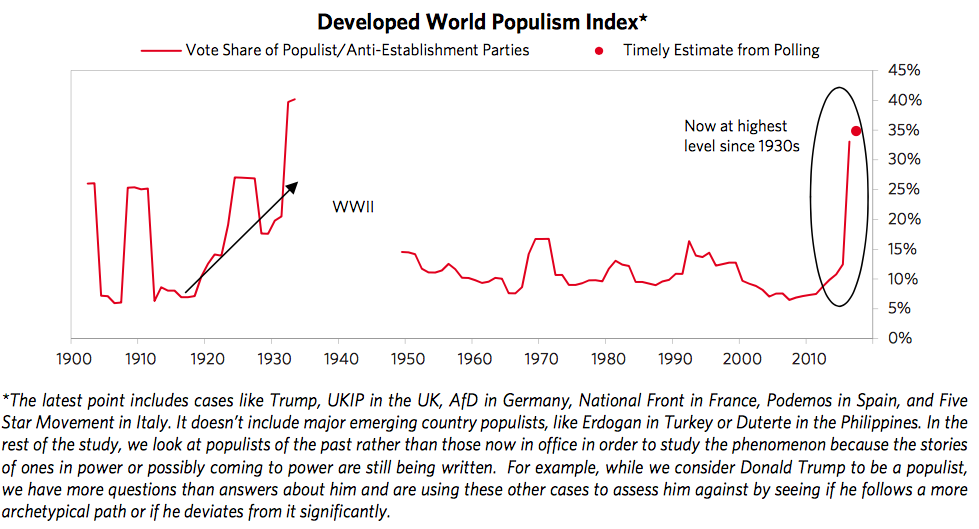Populism: A key worry of our times
Date:08Apr2017
‘Populism’ is receiving a lot of attention lately, which has, most recently, made it to a 61-page report by the Hedge Fund (the largest, apparently), the Bridgewater Associates. The paper provides an encyclopedic account of 14 populist episodes in 10 countries — the populists of the interwar period (that have turned to extremism and to a global threat) and some more recent (mainly Latin) examples (that ended up destroying “just” their own countries). The role of populism in shaping economic conditions will be huge, the authors say, which, by their measure, reached the highest levels since the late 1930s (see their chart below).
Of course, the Bridgewater paper is not the first to point out to the importance and the virulence of this phenomenon as applied to recent times. This Project Syndicate (PS) overview article does a very useful job of compiling some recent writings by PS columnists on the topic. Nor is economic populism a new concept to the students of emerging market macroeconomics, something that has been formalized awhile ago by the work of UCLA’s Sebastian Edwards and the late Rudi Dornbusch of MIT. Edwards and Dornbusch define economic populism as “an approach to economics that emphasizes growth and income redistribution and deemphasizes the risks of inflation and deficit finance, external constraints, and the reaction of economic agents to aggressive nonmarket policies,” as Andres Velasco points out in his PS column. They say that these populist approaches – unsurprisingly — do ultimately fail as a result of unsustainable policies, but as Velasco rightly and disturbingly adds, “ultimately” can be a very long time. “Populist policies are called that because they are popular. And they are popular because they work – at least for a while,” Velasco says. (Here is a recent Cardiff Garcia interview with Prof. Edwards.)
The issue is worth monitoring no doubt, and populism is unlikely to go away until the world finds a new balance. The dislocation caused by the so-called Great Convergence of the past 20-25 years (as detailed in this fantastic book by Richard Baldwin) was one main factor behind the Elephant Curve (as detailed in this other fantastic book by Branko Milanovic). The grievances and resentments are real, but they are being exploited by leaders that do not have any concrete plan other than promising without due consideration of budget constraints or basic economic theory. All we can do is to hope that the center in advanced countries reclaims its position and the Chinese and the like stick to globalization, and a major breakdown in the global order is avoided.

